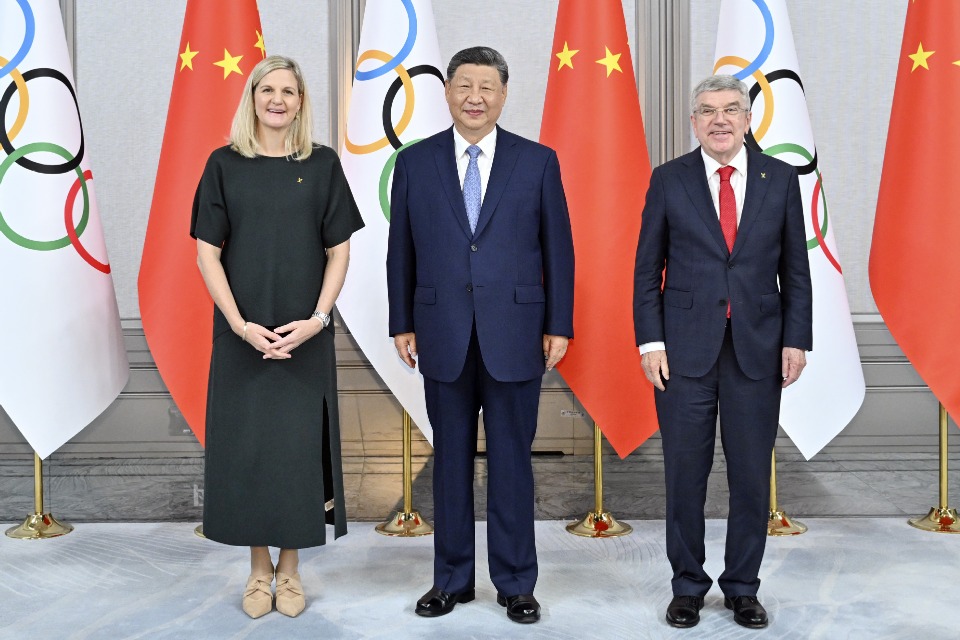Constructive contribution
Infrastructure renaissance in Africa brought about by Chinese investment offers expanded opportunities for accelerated economic diversification that can unlock the opportunities created by the AfCFTA


Infrastructure renaissance in Africa brought about by Chinese investment offers expanded opportunities for accelerated economic diversification that can unlock the opportunities created by the AfCFTA
Africa is largely defined by foreign-led resource extraction. The continent's "chronic dependency" on its raw materials is a result of the economic model left behind by the occupying colonial powers — a model designed to make Africa a reliable source of raw materials for their industrial economies. This chronic dependency on raw materials has long been an observed phenomenon, but African countries have never managed to reverse the trend. As such, African countries have been perpetuating the colonial patterns of production, consumption and distribution. As a way of coming together to rethink and address this, the African Continental Free Trade Area was created. The AfCFTA seeks to play an important role in accelerating regional trade within Africa, which under the colonial-established framework is fairly low.
China is Africa's largest trading partner and becoming a relatively more important market for African countries. In 2022, 12.5 percent of Africa's exports went to China, compared to a mere 0.8 percent at the beginning of the century. According to Chinese official statistics, the total trade value between China and Africa hit an all-time high of $282 billion in 2022, reflecting an 11 percent increase compared to 2021. However, the unique aspect of this trade relationship is not the figures; it's the kinds of activities China has used to promote trade. A major instance is the China-Africa Economic and Trade Expo (CAETE) which originated from the eight key initiatives at the 2018 Beijing Summit of the Forum on China-Africa Cooperation. These eight initiatives are in line with China's statement of striving for more visible and substantive progress in the well-rounded development of African countries. The development of trade to promote inter-regional economic development through the AfCFTA is an essential part of this. China is already positioned to work with African countries to unlock the various opportunities presented by the AfCFTA by supporting Africa to solve one of its binding constraints hindering the acceleration of growth and diversification of intra-Africa trade — the continent's inadequate infrastructure.
Infrastructure is vital to the success of the AfCFTA. However, good transport infrastructure is not available and it is one binding constraint affecting the flow of goods and services in Africa. For example, in terms of doing business, most manufacturing activities require reliable access to electricity for several hours a day at a price that still keeps the activities competitive in the market. However, this is not the case in most African countries, and as a result, Africa's ambition to accelerate industrial expansion that will help unlock the economic potential and create employment resulting from the creation of the AfCFTA continues to be hampered by the continent's unreliable power supply. African countries are predominantly agrarian, but farmers are unable to move up the value chain without electricity for processing and for preserving produce. As a result, Africa's domestic market for agricultural products remains undeveloped. That is why local suppliers are not always able to meet demands because electric power is not readily available. Access to reliable electric power can drive industrialization, bolster productivity and economic growth, spur human development, and it is essential to attain nearly all of the United Nations Sustainable Development Goals (SDGs).
Improving transport connectivity is also essential to enhancing Africa's integration into regional and global value chains. This is because while transportation infrastructure varies greatly across African nations, the general condition of the continent's toll roads and railway lines is similar: obsolete and poorly maintained. The Infrastructure Consortium for Africa argues that the poor quality of the region's roads and rail infrastructure increases the costs of intra-African trade by some 30 to 40 percent. These deficiencies burden African exporters with high input costs, high transport costs, and expensive delays in reaching regional and global markets. Based on this, African countries exhibit the lowest levels of productivity of all low-income nations and are among the weakest competitive economies globally.
As a continent that is eager to develop mega infrastructure projects, under the framework of the Forum on China-Africa Cooperation, China's investments in hard infrastructure resonate well with the African Union's agenda of continental integration which the AfCFTA aims to promote. The Chinese government has repeatedly emphasized its desire to engage with Africa in ways that advance the economic development of African countries. Infrastructure projects in Africa that are financed by Chinese loans have been on an upward trajectory for over a decade and are already supporting Africa to address its infrastructure constraint. Improving connectivity on the continent will enhance African countries' integration into regional and global value chains, enable African companies to reach out to regional and global markets at a lower cost, and enable African countries to import raw materials and intermediate goods more cheaply and export manufactured products more competitively.
Unlike bilateral infrastructure projects of the colonial period that subjected African countries to the distribution systems established by the colonial powers, the Chinese infrastructure projects are aligned with Africa's connectivity agenda to promote intra-continental trade and the realization of the AU's vision of continental integration agenda. This is because based on experience, China acts as a catalyst for economic diversification based on skills and technology transfer coupled with infrastructure, which makes contributions to Africa's development.
Therefore, going forward within the context of the AfCFTA, Africa and China should foster connections between Chinese and African companies to address weak productive capacities, which presently hinder the complete development of economic diversification. This will bolster intra-Africa trade. African countries should move away from their global position as a "commodity periphery". The most efficient way to support African countries accomplishing this is not by selling African goods and services alone, but by buying theirs, supporting them in snowballing their export potential to create local value chains, and establishing local production facilities.
The author is the executive director of the Center for Nigerian Studies at the Institute of African Studies at Zhejiang Normal University. The author contributed this article to China Watch, a think tank powered by China Daily. The views do not necessarily reflect those of China Daily.
Contact the editor at editor@chinawatch.cn.


































